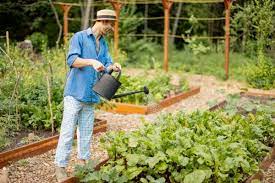With growing concern for the environment, sustainable horticultural practices have become an important part of responsible and eco-friendly gardening. Research into sustainable gardening methods enables gardeners to reduce their ecological footprint, conserve resources, promote biodiversity and cultivate thriving and vibrant gardens. This blog post delves into the importance of sustainable horticultural practices and explores key areas where individuals can make a positive contribution to the environment.
Save water:
precious resource Water scarcity is a major global problem and gardeners have a significant responsibility in terms of contributing to water conservation efforts. By adopting water-related practices such as collecting rainwater, using drip irrigation systems, and mulching, gardeners can significantly reduce water usage. By collecting rainwater, you can take advantage of nature’s bounty and hydrate your garden during dry periods. Drip irrigation systems deliver water directly to the root zone of plants, minimizing evaporation and ensuring efficient water use. Additionally, mulching helps retain moisture in the soil, reducing the need for frequent watering.
Organic soil management:
build a sound foundation garden health starts in the soil. Sustainable gardeners emphasize organic soil management practices that improve soil fertility, structure, and overall health. Compost improves soil structure, increases nutrient availability, and promotes beneficial microbial activity. Additionally, crop rotation, crop diversity practices, and the use of cover crops help prevent soil erosion, reduce pest and disease pressure, and maintain soil health over the long term.
Biodiversity and Native Plants:
Maintaining natural habitats
Promoting biodiversity is essential to maintaining healthy ecosystems and supporting local wildlife populations. Sustainable gardeners value planting native species that adapt to the local climate and provide important resources for native insects, birds, and other animals. Native plants have low water demands and exhibit excellent resistance to pests and diseases, minimizing the need for chemical intervention. In addition, they also provide nectar, pollen, and seeds, providing food for pollinators and attracting beneficial insects such as ladybugs and lacewings that help control garden pests naturally.
Integrated pest control:
Minimize chemical consumption
Sustainable horticulture includes an approach called integrated pest management (IPM) aimed at minimizing reliance on chemical pesticides. IPM combines a variety of strategies to effectively control pests while reducing environmental impact. These strategies include the use of physical barriers such as nets and row covers to protect crops from pests; encouraging natural enemies such as birds and beneficial insects to control pest populations; including selection and care of suitable crops to promote Chemical pesticides can be harmful to beneficial insects, aquatic life and human health, so they are used only as a last resort and for targeted applications.
Species protection: Symbiosis with nature
Sustainable horticultural practices go beyond plants to encompass entire ecosystems, including wildlife conservation. Creating habitats that support local wildlife is essential to maintaining ecological balance. Incorporate features such as bird feeders, bird baths, and native plants with berries and nectar-rich flowers to attract birds, butterflies, and other pollinators. Leave dead trees and stumps as nesting sites, and plant thick shrubs to provide hiding places. Avoid using harmful chemicals that can contaminate food sources or harm wildlife. By consciously living in harmony with nature, gardeners can contribute to the conservation and protection of local biodiversity.
Reduced chemical input:
protection of human health
Sustainable horticultural practices emphasize reducing chemical inputs to protect not only the environment but also human health. Organic gardening methods, such as using compost and natural pest control alternatives, offer a safer alternative that minimizes risks to human health. Additionally, by avoiding chemical treatments, gardeners contribute to cleaner air and water, creating a healthier living environment for themselves and their communities.
Energy efficiency:
thoughtful garden design
Sustainable gardening extends to the design and maintenance of outdoor spaces. Thoughtful garden design helps maximize energy efficiency.

